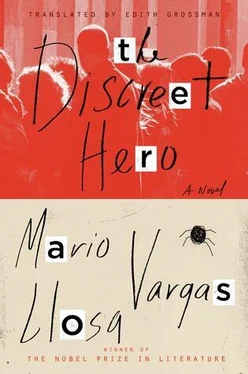“Don’t you want to go out, Rigoberto? Let’s go to the movies and eat out.”
“Let’s watch a movie here instead,” her husband replied. “Just the thought that one of those people with their little tape recorders might show up to take photographs and ask me about Ismael and the twins upsets my stomach.”
Ever since journalists had seized upon the news of Ismael’s marriage to Armida, and his children’s police and judicial actions to annul the marriage and declare him incompetent, nothing else was talked about in newspapers, on radio and television programs, on social networks and blogs. The facts disappeared under a frenetic spluttering of exaggerations, inventions, gossipmongering, libel, and general baseness, in which iniquity, coarseness, perversion, resentment, and rancor came to the surface. If he hadn’t found himself dragged into the journalistic confusion, constantly hounded by hacks who compensated for their ignorance with morbid curiosity and insolence, Don Rigoberto told himself that this spectacle of Ismael Carrera and Armida transformed into the great entertainment in the city — dipped in print, radio, and television filth and unceasingly scorched in the bonfire that Miki and Escobita had lit and stirred up every day with statements, interviews, short articles, fantasies, and deliriums — would have been somewhat entertaining, as well as instructive and informative with respect to this country, this city, the human spirit in general, and the very evil that now concerned Fonchito, to judge by his essay. “Instructive and informative, yes,” he thought again. With respect to many things. The function of journalism in our time, at least in this society, was not to inform but to make the line between the lie and the truth disappear, to replace reality with a fiction in which the oceanic mass of neuroses, frustrations, hatreds, and traumas of a public devoured by resentment and envy was made manifest. One more proof that the small spaces of civilization would never prevail against immeasurable barbarism.
The phone conversation with his former employer and friend had left him depressed. He didn’t regret having lent him a hand by acting as a witness at his marriage. But the consequences of that signature were beginning to overwhelm him. It wasn’t so much the judicial and police complications, or the delay in processing his retirement; he thought (knock on wood, anything could happen) that this, bad as it was, would be settled. And he and Lucrecia would be able to travel to Europe. The worst thing was the scandal he found himself drawn into: Almost every day he was dragged through a journalistic sewer, muddied by a pestilential sensationalism. Bitterly he asked himself, “What good has it done you, this small refuge of books, prints, records, all these beautiful, refined, subtle, intelligent things you collected so zealously, believing that in this tiny space of civilization you’d be protected against lack of culture, frivolity, stupidity, and emptiness?” His old idea that these islands or fortresses of culture had to be erected in the middle of the storm, invulnerable to the surrounding barbarism, wasn’t working. The scandal provoked by his friend Ismael and the hyenas had leaked its acid, its pus, its poison into his study, this territory where for so many years — twenty, twenty-five, thirty? — he’d withdrawn to live his true life. The life that made up for the company’s policies and contracts, the intrigues and pettiness of local politics, the mendacity and idiocy of the people he was obliged to deal with every day. Now, with the scandal, it did him no good to search out the solitude of his study. He’d done so the night before. He put a beautiful recording on the phonograph, Arthur Honegger’s oratorio King David , recorded right in the Notre Dame Cathedral, which had always moved him a great deal. This time, he hadn’t been able to concentrate on the music for an instant. He was distracted, his mind fixed on the images and concerns of the past few days, the shock, the bilious displeasure each time he discovered his name in the reports that, though he didn’t buy those newspapers, friends had sent to him or commented on in an inflexible way, poisoning his life and Lucrecia’s. He had to turn off the phonograph and sit still, his eyes closed, listening to the beating of his heart with a brackish taste in his mouth. “In this country not even a tiny space of civilization can be built,” he concluded. “In the end, barbarism demolishes everything.” And once again he told himself, as he always did whenever he felt depressed, how mistaken he’d been when, as a young man, he decided not to emigrate, to remain here, in Lima the Horrible, convinced he’d be able to organize his life in a way that, even though he’d have to spend many hours a day submerged in the mundane noise of upper-class Peruvians to earn his daily bread, he’d really live in the pure, beautiful, elevated enclave made of sublime things that he would create as an alternative to the everyday yoke. That was when he’d had the idea of saving spaces, the idea that civilization was not, had never been a movement, a general state of things, an environment that would embrace all of society, but rather was composed of tiny citadels raised throughout time and space, which resisted the ongoing assault of the instinctive, violent, obtuse, ugly, destructive, bestial force that dominated the world and now had come into his own home.
That night, after supper, he asked Fonchito if he was tired.
“No,” his son replied. “Why, Papa?”
“I’d like to talk with you for a moment, if you don’t mind.”
“As long as it isn’t about Edilberto Torres, I’d be happy to,” Fonchito said mischievously. “I haven’t seen him again, so don’t worry.”
“I promise we won’t talk about him,” replied Don Rigoberto. And as he used to do when he was a boy, he shaped a cross with two fingers and swore, kissing them: “I swear to God.”
“Don’t take God’s name in vain — after all, I’m a believer,” Doña Lucrecia admonished. “Go into the study. I’ll tell Justiniana to bring you your ice cream there.”
In the study, while they were enjoying the lucuma ice cream, Don Rigoberto, between mouthfuls, spied on Fonchito. Sitting across from him with his legs crossed, he ate his ice cream in slow spoonfuls and seemed absorbed in some distant thoughts. He was no longer a child. How long had he been shaving? His face was smooth and his hair was tousled; he didn’t play a lot of sports but looked as if he did because his body was slim and athletic. He was a very good-looking boy, and the girls must be crazy about him. Everyone said so. But his son didn’t seem interested in those kinds of things; instead, he was interested in hallucinations and religious ideas. Was that a good or bad thing? Would he have preferred Fonchito to be a normal kid? “Normal,” he thought, imagining his son speaking the syncopated, simian jargon of the young people of his generation, getting drunk on weekends, smoking marijuana, getting high on coke, taking Ecstasy in the discos along the Asia beach at kilometer 100 on the Pan-American, as so many of Lima’s wealthy children did. A shudder ran through his body. A thousand times better for him to see phantoms or even the devil himself and write essays about evil.
“I read what you wrote about liberty and evil,” he said. “It was right there, on your desk, and I was curious. I hope you don’t mind. It impressed me a great deal, in fact. It’s very well written and full of original ideas. Which course is it for?”
“Language,” said Fonchito, not giving the subject much importance. “Professor Iturriaga asked for an essay on anything. That topic came to mind. But it’s only a rough draft. I still have to correct it.”
Читать дальше

![Гарри Гаррисон - Bill, the Galactic Hero [= The Starsloggers]](/books/87536/garri-garrison-bill-the-galactic-hero-the-star-thumb.webp)










